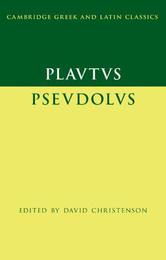
|
Plautus: Pseudolus
Hardback
Main Details
Description
Pseudolus of all Plautus' comedies most fully reveals its author's metapoetics. As its eponymous clever slave telegraphs his every move to spectators, Pseudolus highlights the aesthetic, social, and performative priorities of Plautine comedy: brilliant linguistic play, creative appropriation of comic tradition, interrogation of convention and social norms, the projection of an air of improvisation and a fresh comic universe, and exploration of dramatic mimesis itself. The extensive Introduction analyses Plautus' delightful comedy as a stage-performance, the comic playwright's translation and adaptation practices, his innovative deployment of language and metrical and musical virtuosity, as well as the play's transmission and reception. In addition to detailed elucidation of the Latin text, the Commentary examines Pseudolus as a lens into Roman slave society at the time of its debut at the Megalensian festival of 191 BCE. The edition engages throughout with current criticism and issues of interest to both students and scholars.
Author Biography
David Christenson is Professor of Classics at the University of Arizona. He is the author of a Cambridge Greek and Latin Classics Series edition of Plautus' Amphitruo (2000), and his volumes of translations include Hysterical Laughter: Four Ancient Comedies about Women (2015), Roman Comedy: Five Plays by Plautus and Terence (2010), and Plautus: Casina, Amphitryon, Captivi, Pseudolus (2008). In 2019 he published a companion to Plautus' Casina in the new Bloomsbury ancient comedy series.
Reviews'Christenson's commentary is a real achievement, and probably the best commentary on Pseudolus that we have ... I recommend this commentary very highly.' Wolfgang D.C. De Melo, Resenas Reviews
|